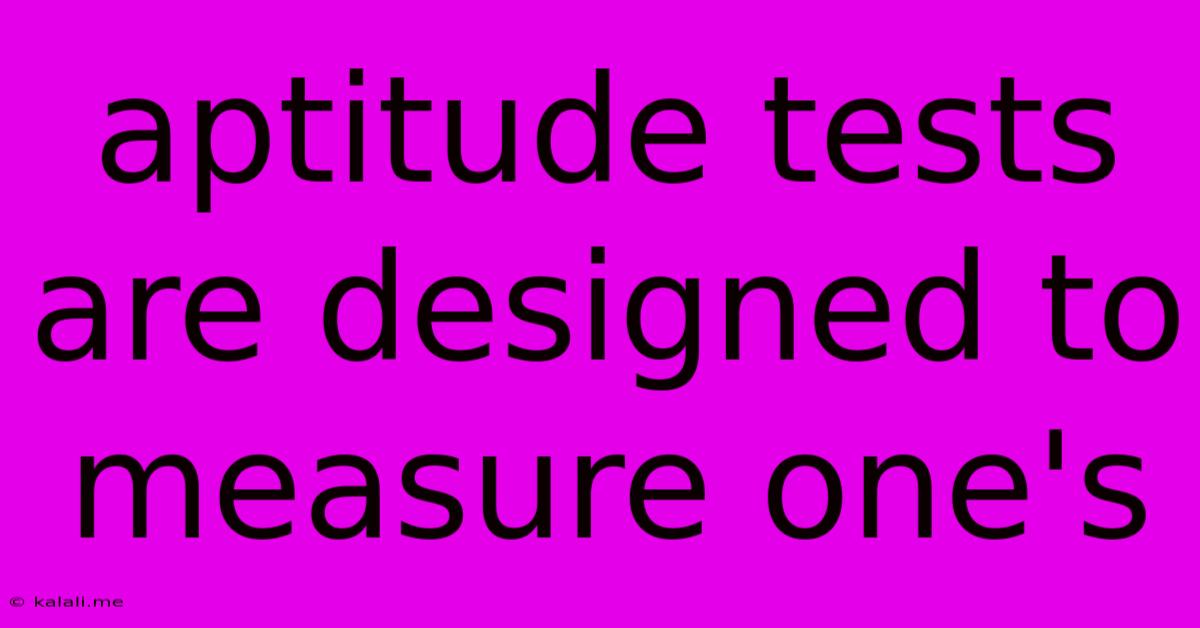Aptitude Tests Are Designed To Measure One's
Kalali
Jun 14, 2025 · 3 min read

Table of Contents
Aptitude Tests: Designed to Measure Your Potential
Aptitude tests are designed to measure your potential to learn and succeed in a specific area or field. Unlike achievement tests, which assess your past learning and knowledge, aptitude tests focus on your inherent abilities and cognitive skills. This makes them a valuable tool for career guidance, educational placement, and even personal self-discovery. Understanding what aptitude tests measure is crucial for both test-takers and those interpreting the results.
What exactly do aptitude tests measure? The specific skills and abilities assessed vary depending on the test, but generally fall under these categories:
Cognitive Abilities: The Building Blocks of Aptitude
Many aptitude tests focus on measuring fundamental cognitive abilities, which form the basis for learning and problem-solving. These include:
- Verbal Reasoning: This assesses your ability to understand and analyze written information, including vocabulary, reading comprehension, and logical deduction from text. Examples include identifying synonyms, analogies, and interpreting passages.
- Numerical Reasoning: This measures your ability to work with numbers, including calculations, data interpretation, and logical reasoning involving numerical data. You might encounter questions on percentages, ratios, and data analysis.
- Spatial Reasoning: This tests your ability to visualize and manipulate objects in space. This often involves mentally rotating shapes, understanding relationships between objects, and visualizing three-dimensional objects from two-dimensional representations.
- Abstract Reasoning: This assesses your ability to identify patterns, relationships, and rules in abstract or non-verbal information. It often involves recognizing sequences, completing patterns, and identifying the underlying logic in complex designs.
- Logical Reasoning: This broader category encompasses the ability to think critically, analyze information systematically, and draw logical conclusions. It draws on elements from verbal, numerical, and abstract reasoning, applying them to solve problems and deduce inferences.
Specific Aptitude Tests: Tailored Assessments
Beyond these core cognitive skills, aptitude tests can also focus on more specialized abilities, depending on the intended purpose:
- Mechanical Aptitude Tests: These assess your understanding of mechanical principles, tools, and machinery. They might involve questions on simple machines, force, and motion.
- Clerical Aptitude Tests: These measure skills important for clerical and administrative roles, such as attention to detail, accuracy in data entry, and speed of processing information.
- Musical Aptitude Tests: These tests assess potential musical ability through tasks involving rhythm, melody recognition, and pitch discrimination.
Why are Aptitude Tests Used?
The applications of aptitude tests are wide-ranging:
- Career Guidance: Helping individuals identify careers that align with their strengths and abilities.
- Educational Placement: Determining the appropriate educational programs or tracks for students.
- Employee Selection: Assessing the potential of job candidates for specific roles.
- Personal Development: Understanding one's own strengths and weaknesses to facilitate personal growth and self-improvement.
Interpreting Aptitude Test Results
It's crucial to remember that aptitude tests are just one piece of the puzzle. Results should be interpreted within the context of other factors such as educational background, experience, and personal goals. A low score in one area doesn't necessarily indicate a lack of potential; it may simply suggest a need for further development or training in that specific skill. A comprehensive understanding of your strengths and weaknesses, combined with personal reflection and professional guidance, will ultimately lead to the most informed decisions.
Latest Posts
Latest Posts
-
Example Of Solid Dissolved In Solid
Jun 14, 2025
-
Air Pressure At Sea Level Is Equal To
Jun 14, 2025
-
What Is The Opposite Of Reluctant
Jun 14, 2025
-
Brass Is A Mixture Of What
Jun 14, 2025
-
Which Of The Following Are Pure Substances
Jun 14, 2025
Related Post
Thank you for visiting our website which covers about Aptitude Tests Are Designed To Measure One's . We hope the information provided has been useful to you. Feel free to contact us if you have any questions or need further assistance. See you next time and don't miss to bookmark.